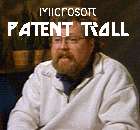
Summary: Patent trolls are in the news again and it's rather important, albeit for various different reasons, more relevant than the ones covered here in the past
THE relentless attempts to redefine "patent troll" -- attempts which can be largely attributed to patent trolls themselves (and their lobbyists, such as Bill Gates' and Nathan Myhrvold's lobbyists) -- were covered here in past years and we continue to see much of the same now that politicians are said to be going after "trolls" (an elusive 'reform' that will go almost nowhere). The remedy will most likely necessitate some kind of scope limitation; this scope should be a debate around patents, not the aggressor's scope or scale. The world's biggest trolls are often not characterised in the corporate press as "trolls" at all. It is a form of propaganda or a game of words that defames small players and glorifies larger players that engage in the very same behaviour.
As the troll-tracking Steph
put it the other day, we cannot rely on politicians. "I’m on record many, many times agreeing that legislation is not the way to curb patent trolling," she explained. "It’s right there in the name of the offender: “troll”. It may slow them down temporarily, but overall, anyone called a “troll” is going to come back swinging a few months or years later with a whole new set of workarounds. It’s impossible to stay fully head of them with laws." Whereas by going after the patents themselves would help eliminate abuse, no matter if the abuser is as large as Microsoft or as small those many no-name trolls. Nathan Myhrvold (shown above) is already seeing his massive patent troll imploding (lots of layoffs) and litigation rates have gone down considerably just after the Alice ruling. It was about patent scope. According to those who
pursue reform only targeting patent trolls, "It’s been reported in a few places that a recent Lex Machina report states that patent litigation is down 40% from last year. Of course, the patent trolls are trying to use these inaccurate reports to argue that the patent troll problem is essentially solved."
This is untrue. The reality is, the Alice ruling seemingly weakened many of them. They were reliant on software patents, based on statistics acquired some years back. It shows that by pursuing changes around patent scope we can achieve many of the overall goals; it's a domino effect.
In other
interesting news,
China is said to be turning into quite the hotbed of patent trolls and Glyn Moody writes: "The Chinese government's move is part of a larger story that recapitulates America's own evolution from a "pirate" nation that fuelled its industrial revolution by ignoring the law and appropriating Western Europe's patented ideas, to one using the same legal instruments against European companies."
Here we have yet another reason to narrow the scope of patents. Trolls are a symptom of a scope too broad and China can take advantage of it. Not only trolls are impeded by elimination of "abstract" patents (which include software patents); everything in the patent system (universally) is affected by that, irrespective of the size of the plaintiff.
⬆

